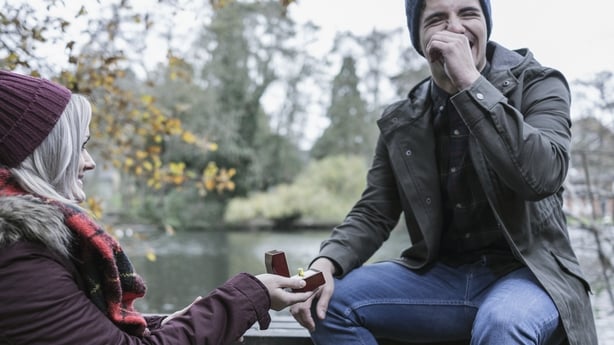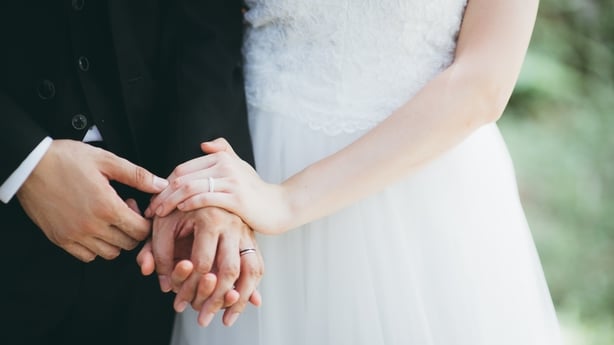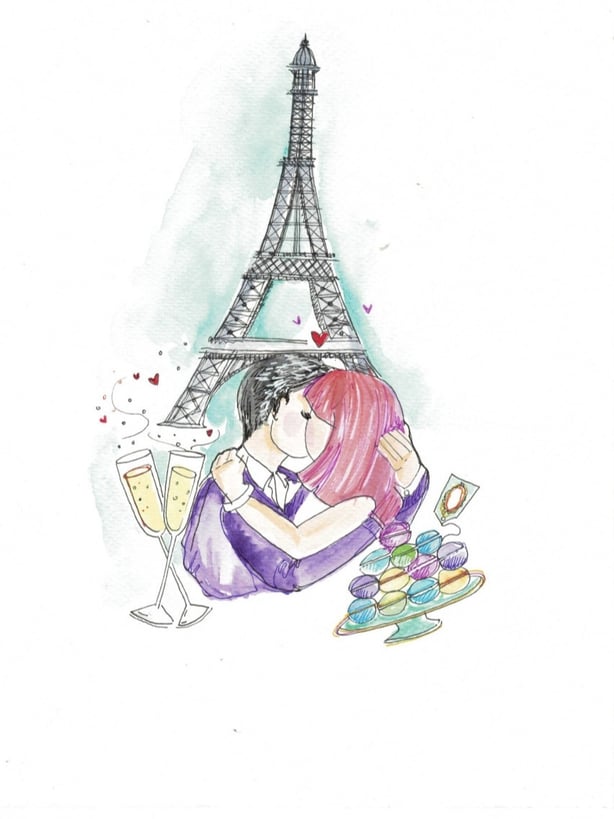Dr. Caroline West is a sex educator and host of the Glow West podcast, which focuses on sex, sexuality, and the body. Here, she shares how she proposed to her husband, and why the Leap Year set an important precedent for how Irish women think about marriage.
I've never been a fan of the traditional wedding and all it involves, and this extends to the proposal too.
To me, the worst way to be engaged is someone putting me on the spot, especially in front of other people, as it's a lot of pressure and an instant yes is expected, or else it becomes very awkward, very quickly.
So, when I felt that I had met my future husband, I commissioned a wonderful artist called Vanessa Marsh to draw a series of pictures of our previous dates, and asked a friend to set it to music, and sent it to him on Christmas Day.
He was delighted, and then a little surprised when I informed him that I would like him to also propose. This was because I think both partners should be asked, since getting married is a joint decision. He soon got over his shock and had his proposal a few weeks later. Unsurprisingly, our wedding was non-traditional too in Vegas.

Today, 29 February, is one that for centuries has been reserved for women to take charge and ask their partner to marry them.
It's especially relevant this year as we celebrate St Brigid with her own bank holiday, as St Brigid and St Patrick are the origins of this tradition, way back in the 5th century. The story goes that Brigid expressed her frustration that women had to wait around to be asked for their hand in marriage, so Patrick ever so generously decided that it was acceptable for women to ask - but only every four years, on 29 February.
This folklore tradition became law in Scotland centuries later where men were ordered to say yes, but if they were insistent on refusing, they had to offer compensation to the woman. (One wonders if there were enterprising women who proposed to numerous men on this day in order to receive quite the payday!).
This day became known as Bachelors Day or Ladies Privilege Day, and the tradition has endured to this day, despite women now of course being able to propose whenever they want.

We might be shocked that Scottish men were legally compelled to say yes, but women have been forced into marriage for millennia, and still are in many countries. If a woman wanted to have children in Ireland in the last century, she had to be married or face being sent to a laundry or a mother and baby home, with her child at risk of being taken from her and potentially sold for illegal adoptions.
Women therefore did not experience the freedom to decide when they wanted to be married, and since contraception was illegal from 1937 to the end of the 20th century, she had little choice about when she wanted to start or complete her family.
The very existence of one specific day that women were permitted to ask a partner to marry them tells us that for at least 15 centuries, women were expected to be passive and wait for a man to make the decision about their futures. This is reflected in many religious teachings, and was especially cemented in Ireland with the fight for independence and the framing of Irish women as pure, chaste, and homemakers.
Sex education guides in the 1960s still gave advice to women that they should be subservient to their husbands, and - especially concerning - told women that they should engage in sex whenever their husbands wanted it, even if they themselves didn't. In this context, women were framed as having no desire of their own, no agency, and their consent was not important enough to take into consideration.

Marriage is a big conversation to have, especially when it comes to discussing what your idea of marriage is and if it aligns with your partners. Some people want their spouse to give up work, or become a homemaker, some want a traditional marriage where the woman is a submissive partner, and some expect finances to be shared.
Children also have to be discussed, as it will be a dealbreaker if one person wants them and the other doesn’t or wants a different amount. All these factors are essential because if you are on completely different pages, a marriage will be unlikely to work with one person being unhappy. These are all conversations to have before you become legally tied to each other, not after.
When myself and my husband shared our news, we did get some shocked responses, and I watched people quickly rearrange their faces when they found out I proposed - especially as I didn’t have an engagement ring, since I don’t wear jewellery.

The responses reminded me that we often have pre-formed ideas about what we 'should’ do, and what the ‘norm’ is. The good news is that it's okay to live the kind of life you want, on your own terms and your own timeline, and not be restricted by your gender, or having to copy everyone else.
Norms around marriage and commitment are changing, and it's heart-warming to see more and more people embrace their authentic selves and live on their own timelines. This is reflected in Ireland in research from Bumble that says that 1 in 3 women have rejected this social pressure to be married by a set time, or even married at all.
A third of women say it's particularly important to be on the same page as their partner, and this is essential when considering the long-term nature of a relationship. We don’t have to wait until another person decides it's the right time for a proposal, or any other event - we can choose when we are ready ourselves.
What a change from the 1970s when women had to give up their jobs upon marriage and were expected to have multiple babies. If this change has been embraced, we can also embrace the freedom of women in every aspect of their relationships too.
Dr Caroline West's first book on Monto, Dublin’s forgotten red light district will be published later this year. Find her at @drcarolinewest on Instagram.
The views expressed here are those of the author and do not represent or reflect the views of RTÉ.


